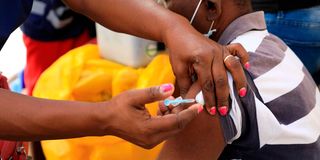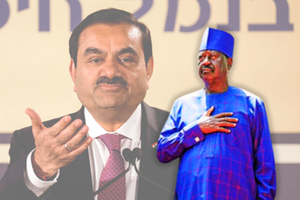Never again: After 'vaccine apartheid', Africa fights back

A medic administers a Covid-19 vaccine: While Covid-19 is now largely under control, the sad experience of vaccine apartheid is far from forgotten.
Nothing was a bigger jolt to African policy makers on the need for self-reliance than what came to be known as “vaccine apartheid”. Simply put, first world countries and major pharmaceutical companies hogged Covid-19 vaccines at the expense of poorer countries that did not manufacture their own and who consequently relied heavily on imports.
It's now more than three years since the first case of the viral disease was reported in China. While Covid-19 is now largely under control, the sad experience is far from forgotten. This has since spawned a continent-wide push for Africa to produce its own vaccines and cut over-reliance on big pharma.
Globally, the concentration of vaccine production lies in a few high-income countries, leading to vast inequities in access during global health emergencies such as the Covid-19 pandemic. Currently, Africa produces just 1 per cent of the vaccines it uses (about 1 billion doses) and gets the rest from Western multinationals, yet it consumes 25 per cent of all vaccines produced globally.
So how did we get here? There are a combination of factors including high cost of manufacturing, poor inefficient production value chains and bad financing models to support local production of vaccines.
The failure to globalise the vaccine ecosystem to include the production of medicines in more lower income countries has left Africa vulnerable, and led to “vaccine apartheid” during the recent pandemic.
How things are changing
However, it's not all bad news. Things are already changing: for instance, more countries in Africa are currently involved in research and development of vaccines. Just last week, Rwanda acquired its first modular container prototype known as BioNTainers which use mRNA technology to produce vaccines. The centre is Kigali's first mRNA manufacturing hub, with similar facilities to be set up in Senegal and South Africa.
Currently, the African vaccine manufacturing landscape is consolidated across just six countries including South Africa, Morocco, Tunisia, Egypt, and Senegal. Production is happening at Institut Pasteur d'Algérie (Algeria), Institut Pasteur de Dakar (Senegal), Institut Pasteur de Tunis (Tunisia), Vacsera (Egypt) and at the Ethiopian Public Health Institute (Ethiopia). In South Africa, vaccine production is happening at Biovac and Afrigen Biologics and Vaccines.
Some of the manufacturers, including at Afrigen which is based in Cape Town, have begun human trials.
In a world first, Afrigen used Moderna's mRNA Covid-19 vaccine data to make its own version of the shot last year. The vaccine candidate was the first to be made without the assistance and approval of the original manufacturer. It was also the first to be developed and assembled at laboratory scale in Africa.
“We have to build this sector at all costs. This is our breakthrough as a continent and it’s now,” said Prof Petro Terblanche, Afrigen managing director, when journalists toured the facility in South Africa earlier this month.
“If African countries come together and make Afrigen the mRNA vaccine hub, then the continent will have their first vaccine manufacturing hub, making it the first mRNA vaccine in Africa to receive approval from the World Health Organization,” Prof Terblanche added.

The Afrigen biotechnology company and vaccine hub facility in Cape Town. The South African biotech consortium is seeking to make Africa’s first homegrown messenger RNA jab against Covid-19 to overcome unequal access to inoculations and help the continent towards vaccine autonomy.
mRNA technology teaches its cells how to make a protein that will trigger an immune response in a person's body, rather than putting a weakened or inactivated germ into the human body.
Most of the world's mRNA vaccine trials have been happening in high-income countries, with minimal interest in Africa. Only two mRNA vaccines have been approved for Covid-19 – one from Moderna, and the other from Pfizer and BioNTech.
Vaccines for neglected diseases
But with the lessons learnt after Covid-19 on the need for Africa to produce its own vaccines, the WHO in April last year asked countries to send proposals to scale up production and access to coronavirus shots. Afrigen then partnered with Biovac and the Medical Research Council (MRC) to table a proposal as a consortium.
“We saw this as an opportunity to establish and develop vaccines for neglected diseases in low-income countries that are of little priority to high-income countries, either because the market is smaller or return on investment is not there,” Prof Terblanche explains.
At the hub in Cape Town, manufacturers from low and middle-income countries are trained on the entire process of developing a vaccine using mRNA technology.
“The hub targets to lower cost of vaccine production while maintaining the same safety and efficacy,” Prof Terblanche says.
Afrigen is working on cloning the vaccine as part of WHO’s efforts to make technology and treatments related to Covid-19 more widely available. The hub will not only produce Covid-19 vaccines but also use the knowledge to produce other vaccines such as for HIV, malaria and tuberculosis.
Different model
Prof Terblanche explains that the hub's model is different from that of big pharma. Batch sizes are smaller thus giving the hub unique flexibility. The model, she explained, does not have to be big to be sustainable and relevant.
“At the hub, we can make a quick vaccine even for a small group of people. You cannot get this in a facility that is geared towards making profits. We are not profit-oriented,” she said.
The end goal is to contribute to a more robust public health system and enhance vaccine accessibility.
On sustainability, she says there's need for African governments to commit to local manufacturing.
“The time is now. We must make this work. We have to invest and guard it as our project or else it will turn into a white elephant that never picked up...It is essential that African leaders have the ability to have a long-term plan.”
The Covid-19 pandemic demonstrated that reliance on a small number of companies to supply global public goods “is limiting, and dangerous”, WHO Director-General Dr Tedros Adhanom Ghebreyesus previously said.
“In the mid to long-term, the best way to address health emergencies is to significantly increase the capacity of all regions to manufacture the health products they need, with equitable access as their primary endpoint.”





